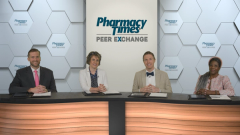
Unmet Needs Associated with RSV Infection in Adults
With their closing thoughts, the panelists explore unmet needs in the landscape of adult RSV vaccination.
Episodes in this series

Ryan Haumschild, PharmD, MS, MBA: Before we conclude, I want to get some thoughts on unmet needs from each of you. Dr Welch, what are some of the other unmet needs associated with RSV [respiratory syncytial virus] infections in adults?
Adam C. Welch, PharmD, MBA, FAPhA: Most individuals will have RSV and not realize it. They can transmit that RSV to someone who will generate the symptoms and complications…. So it’s going to take a community to think about prevention strategies—hand washing, covering your coughs and sneezes, respiratory droplets, and so forth. But a lot of the adult population perceives this as a mild disease. It’s not mild if you’re in the hospital with RSV, and there are 60,000 to 160,000 RSV hospitalizations each year among older adults. There’s an unmet need: we need to bring individuals who would be able to fight an RSV infection. They help with the prevention for individuals who would have bronchiolitis and pneumonia if they came down with RSV. With vaccines, we’re talking about older adults, the maternal population, and infants. Adults 18 to 49 who are not pregnant are potential asymptomatic carriers of RSV, but we have to have discussions about RSV for their family’s sake and discussions about prevention strategies for their family’s sake.
Ryan Haumschild, PharmD, MS, MBA: Awareness is a key piece of that. I’m glad we’re discussing it because it starts with us as pharmacists and providers and family members to get the word out. That way, patients can start to recognize this as an important part of their journey, especially older adults. Ms Bridgman, I want to hear some final thoughts from you as well regarding unmet needs.
Mary Bridgeman, PharmD, BCPS, BCGP, FASCP: For adults, [we need to] prioritize the need for treatment options. There is a fairly deep vaccine development pipeline for RSV. Besides the 2 products we’ve focused our remarks on, there are a number of additional vaccines on the horizon. But for managing severe disease, we have a limited armamentarium. [We need to] prioritize the availability of newer antivirals, or antivirals in general, for this space. Perhaps monoclonal antibodies indicated for RSV management for adults should be a priority. [We need] treatments to augment the supportive care practices and address the morbidity and mortality associated with RSV. [That’s] paramount and unmet.
Ryan Haumschild, PharmD, MS, MBA: Unmet, but we’re addressing that. I’m glad you brought that up. Dr Madison, you’ve had a lot of great thoughts throughout this discussion, focusing on technology and even the importance of vulnerable populations and social determinants of health. With all the good work in front of us, there are still some unmet needs you’re thinking about as well. What are those? What are some things we can address in the future?
Christina Madison, PharmD, FCCP, AAHIVP: No. 1 is the routine use of mitigation management from a public health standpoint. In general, good hand hygiene sounds simple, but many individuals still don’t wash their hands or wash down surfaces. [We need to] go back to some of those public health measures, specifically public health countermeasures, that we implemented during the pandemic, like hand hygiene, covering your cough, wearing a mask, distancing, not going out if you’re sick. Stay home.
These are things that seem simple, but our workforce policies don’t allow individuals to stay home when they’re sick. The pandemic allowed for an extension of that. But now that we’re no longer under the emergency declaration, I’m afraid we might go back to some of those poor practices where we required individuals to work while they were ill. Stay home if you’re sick, wash your hands, social distance. If you shake someone’s hand, use hand sanitizer. You don’t know where they’ve been. Good overall health and wellness [includes] making sure you’re up to date with your vaccinations. When we think about our historically marginalized populations and those who may be at higher risk of engaging with them, talk about some of the ways they can have better preventive care and not get to the point where they need to use the health care system in an acute manner.
Ryan Haumschild, PharmD, MS, MBA: Focusing on prevention is a big part of what we can do. We all play an important role.
Thank you to my excellent expert faculty for a great discussion and to our viewing audience. We hope you found this Pharmacy Times®Peer Exchange to be rich and informative.
Transcript edited for clarity.
Newsletter
Stay informed on drug updates, treatment guidelines, and pharmacy practice trends—subscribe to Pharmacy Times for weekly clinical insights.

























